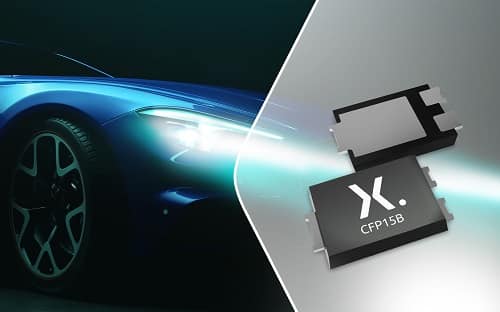Nexperia’s new Clip-bonded FlatPower (CFP) packaged diodes are optimized for low forward voltage (VF) and deliver low conduction losses making them suitable for industrial and automotive applications.

Nexperia has announced new models of Clip-bonded FlatPower (CFP) packaged diodes to its existing portfolio. The new launch includes 32 planar Schottky diodes and eight hyperfast recovery rectifiers housed in the CFP15B package and has an operational range between 30-100 V and 3-15 A. These diodes are suitable for industrial and automotive applications.
The new diodes are optimized for low forward voltage (VF) and deliver low conduction losses. This makes it suitable for application in high-efficiency, cost-efficient DC-DC converters, moreover, these diodes can also be used in reverse polarity protection applications. The diodes meet AEC-Q101 automotive qualification standards making them safe for use in harsh automotive environments.
The new CFP packaged diodes are also available in low leakage variants with ultra-low reverse current with wide operating temperature capability, which enables high robustness against thermal runaway. The eight 200 V single-type recovery rectifier devices have an average forward current (IF) between 4-10 A and complement existing dual-type recovery rectifiers also available from Nexperia.
The smaller package of these diodes enables design engineers to save up to 60% of board space while maintaining a performance similar to the large and bulky diodes available in DPAK or SMB/C packages. The diodes can be used in Advance Driver Assistance Systems (ADAS), EV, LED lighting or Electronics Control Unit (ECU) applications relying on advanced high-density designs.






